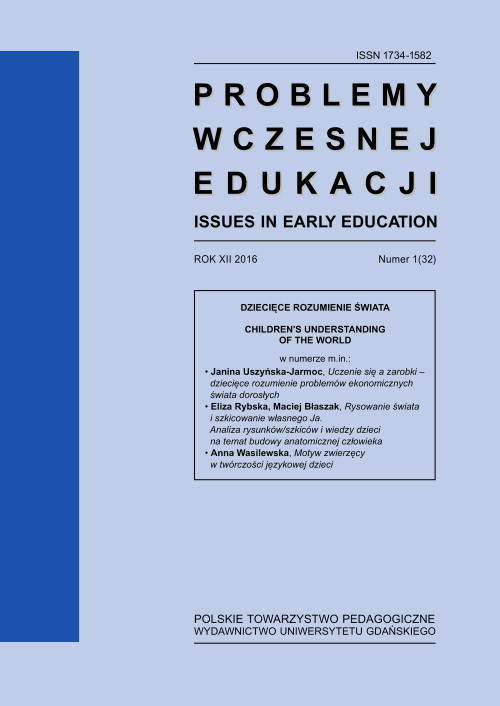The philosophical view of learning from existential experiences in childhood Summary
DOI:
https://doi.org/10.5604/01.3001.0008.5642Słowa kluczowe:
learning, children, experience, existential, death, responsibility, awarenessAbstrakt
This article analyzes the topicality and the understanding of an existential question in the context of life-learning in childhood. Discussing the topicality of the theme of death in childhood, the article provides an answer to the question – what does a child learn from his existential experience when facing death, and what is the significance of this experience in his further development? The existential experience of the child affects such developmental aspects of his personality as the overcoming of his helplessness and anxiety management, intellectual development, responsibility, and renunciation of hostility and destructiveness. As the experience of a child is formed in conjunction with the adult world and its inherent existential anxiety, it is important for a teacher to come to terms with himself, without relying on systems and ideologies.
Downloads
Bibliografia
Daniela L., Kalniņa D. (2008), Skolotāju darbība pusaudžu mācību disciplīnas veicināšanā (Teachers’ activities facilitating teenagers’ learning discipline). Teacher of the 21st Century: Quality Education for Quality Teaching (ATEE), 2008.
Feifel H. (1977), New meanings of death. NY, McGraw-Hill.
Freud A. (1936), Das Ich und die Abwehrmechanismen. Wien, Internationaler Psychoanalitischer Verlag.
Furman E. (1981), A child‘s parent dies: studies in childhood bereavement. New Haven, CT, Yale University Press.
Gorer G. (1955), The pornography of death. “Encounter”, October.
Göhlich M., Zirfas J. (2007), Lernen: Ein pädagogischer Grundbegriff. W. Kohlhammer Verlag.
Haidegers M. (1991), Vēstule par humānismu (Letter on humanism). “Grāmata”, 10.
Heidegger M. (1967), Sein und Zeit. Tübingen, Max Niemeyer Verlag.
Horney K. (2013), Neurosis and human growth: the struggle toward self-realization. London, Routledge.
Klein M. (1948), A contribution to the theory of anxiety and guilt. “International Journal of Psychoanalysis”, Vol. 29.
Lapouse R., Monk M. (1959), Fears and worries in a representative sample of children. “American Journal of Orthopsychiatry”, Vol. 29, Is. 4.
Maurer A. (1966), Maturation of concepts of death. “British Journal of Medical Psychology”, 1966, Vol. 39, Is. 1.
Max Scheler (1874–1928): centennial essays (ed. by Frings M.S.) (1974). The Hague, Martinus Nijhoff.
Mead M. (1952), Coming of age in Samoa. NY, The New American Library.
Piaget J. (2005), The language and thought of the child. London, Routledge.
Rochlin G. (1965), Griefs and discontents: the focus of change. Boston, Little, Brown.
Sartre J.P. (1960), L’Etre et le néant. Paris.
Stern M. (1951), Pavor nocturnus. “International Journal of Psychoanalysis”, Vol. 32.
Sully J. (1896), Studies of childhood. NY, D. Appleton and company.
The biggest questions ever asked. “New Scientist”, 2006, 18 November, No. 2578.
Vygotsky L. (1978), Mind and society. Cambridge, MA, Harvard University Press.
Yalom I. (1980), Existential psychotherapy. N.Y., Basic Books.
Yalom I. (2008), Staring at the sun. San Francisco, Jossey-Bass.
Кришнамурти Д. (2003), Образование и смысл жизни. Москва, София.
Эриксон Э. (1996), Детство и общество. Университетская книга.

 Uniwersyteckie Czasopisma Naukowe
Uniwersyteckie Czasopisma Naukowe





